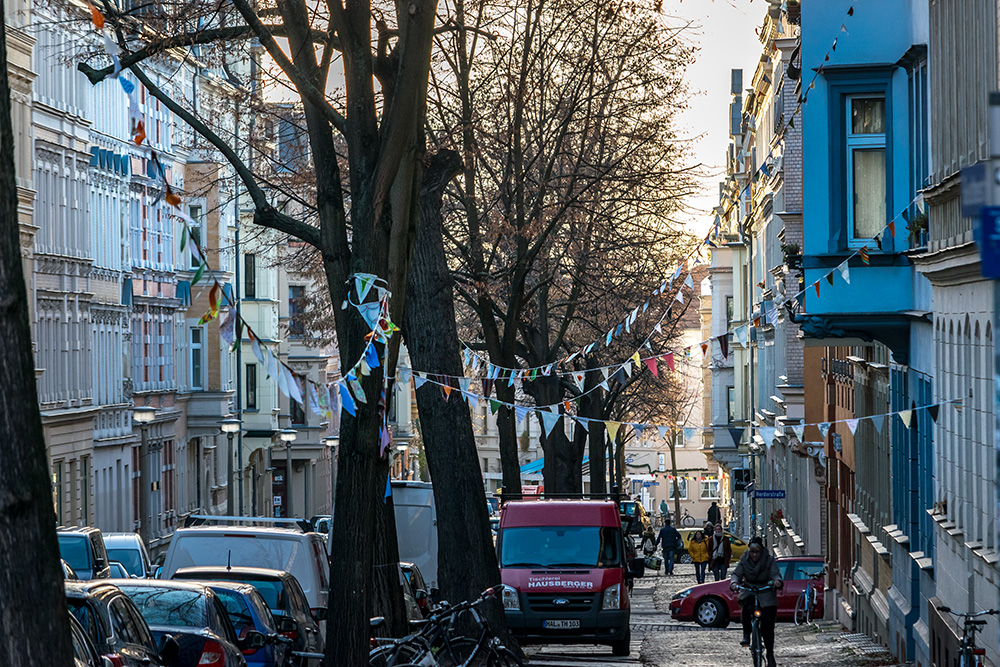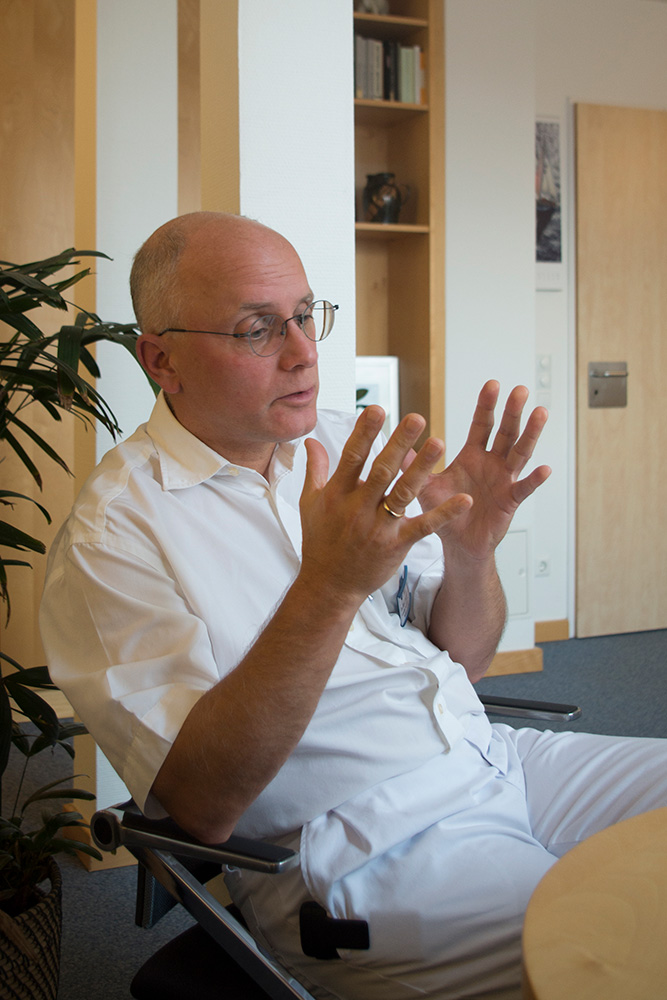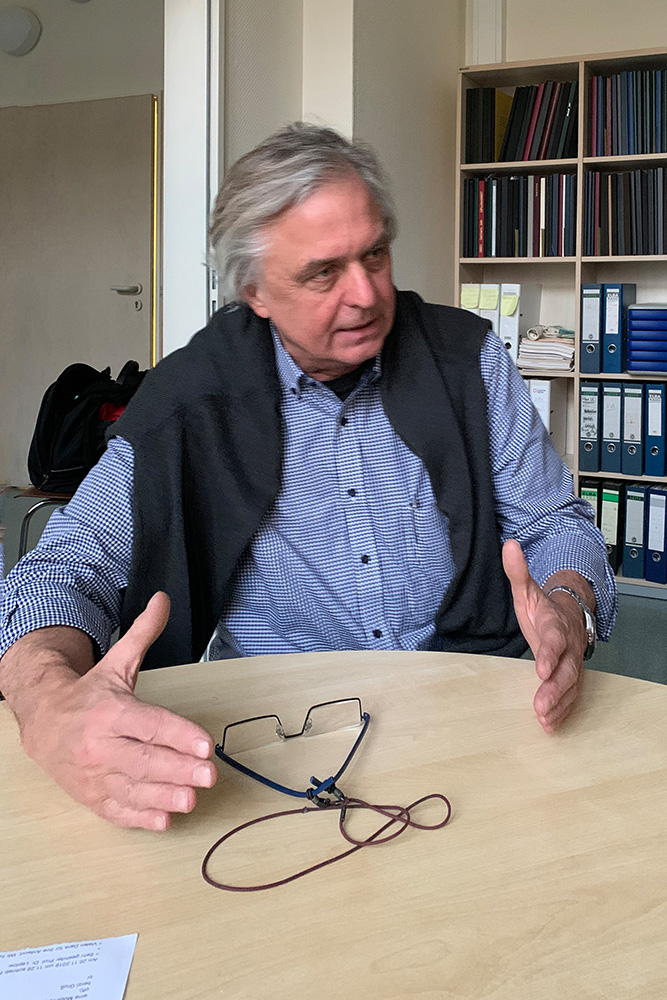Terrorist attacks such as the one that took place on October 9th in Halle are shocking events: They are unnerving and generally challenge the state of coexistence in a community. Dealing with them is often rather difficult, but possible. What such events can trigger, but do not have to.
This article appeared in
No. 87 (January 2020)
This winter, colorful streamers fly above Humboldtstraße, cut-out triangular scraps lined up from house to house or the nearest lantern. The local residents wish to show that their dedication to diversity is much stronger than the right-wing extremist terror which descended upon Paulusviertel on October 9th out of nowhere. Indeed, many people in Halle felt the need to voice their values in such ways for days and weeks afterwards – a reaction that is not only a political statement, but also a testament to the necessity of mutually shared processing of what had unfolded. But where does this urge to take matters into one’s own hands come from?

The ways in which people deal with disturbing events can naturally differ. In this particular context, there are those of Halle’s citizens which have experienced the attack more or less up close. Some of them find their way back into everyday life quite quickly, whilst others cannot shed the queasy feeling inside of them for some time. For those, however, that were directly involved, such as eye-witnesses and relatives of the victims, psychological consequences of a much graver nature may follow.
Precisely defining medical trauma
In the context concerned, traumatic is a term often used to describe the ways in which a respective event affected victims, but also to outline the ways in which it impacted society as a whole. However, the latter is not always entirely correct in a medical sense. “According to the criteria of scientific classification systems, a trauma can only be attested for persons directly involved or connected to the events,” explains Dr. Utz Ullman, head of medical psychology at the Bergmannstrost hospital in Halle. While a general uncertainty was evident among many of the people of Halle in the wake of the attack, trauma would not be the adequate word to use for their condition. Prof. Dr. Bernd Leplow, professor of psychology at MLU does however recognize that “such occurrences may be traumatic for societies used to democratic and constitutional circumstances in a cultural sense.”

Photo: Jonas Kyora
In a scientific sense, a trauma is less of a psychological condition, but more of an incident. It is triggered when people find themselves in absolutely unusual situations. “The central moment of a traumatic situation is the loss of control, tied to a feeling of personal dread,” says Ullmann. “Oftentimes, this causes a shock reaction,” he continues. He points out the importance of understanding that this is just “a normal reaction to an unusual situation.” Anxiety, memory gaps and disorientation may be caused by such an exceptional state. Only when these symptoms continue to last for longer periods of time and the person afflicted finds himself unable to properly process them, a pathological and abnormal state can be attested and professional help is needed.
Taking action helps
Initially, automatic handling mechanisms for critical situations are called upon by persons directly and indirectly involved. In general, “sufficient agency to do anything is needed to regain personal stability,” states Ullmann. Prof. Leplow also highlights how important it is to channel “normally free-flowing emotions” into actions. “Otherwise, a stressor will remain active in the brain.” In psychology, a stressor is an impulse preparing people to act. Leplow explains that in traumatic situations, there is a severe activation of stressors that persist without any subsequent action processing them. The inability to act is by itself a stressor.
According to Ullmann, exchange with friends and family could help in such situations. Some might resort to gardening or listening to music. What might help best depends on the individual personality, of course. In case of a massive burden such as after a terror attack, it could happen that “afterwards, one feels numb and unable to resort to coping mechanisms at all.” Help provided by professional therapists “starts with very little things,” explains Ullman. “For example, the patient is asked which chair he likes to sit in, in order to put control back into his hands step by step.” Moreover, most patients are initially isolated. They are to be protected, so they may regenerate and are not exposed to “secondary trauma” by events that take place in society, the press or on social media.
Rituals provide a sense of community
Nonetheless, he states that the public reaction to the terror attack is understandable as well. The concert that took place at the market square ten days later, the processions and rallies in front of the synagogue of Halle’s Jewish community are thus to be seen as normal reactions. “Even if the specific individual therapeutic dimension is more important to single victims, rituals are crucial for the city as such,” asserts Ullmann. Leplow also thinks that rituals are an opportunity for people to channel their experiences and thus counter the stressor of having been unable to act. Those not touched by these expressions are not less normal according to Ullmann: “They have enough coping resources to deal with the events by themselves.”

Photo: Jonas Kyora
What is however not quite without its problems are the visits paid by numerous politicians following the attack. While President Steinmeier and Interior Secretary Seehofer visited the synagogue the day after the attack in a relatively calm manner and expressed their condolences, the visit by the US Secretary of State, Mike Pompeo, four weeks later caused quite the fuss: Police helicopters circled the north of the city, Ludwig Wucherer Straße and Paulusviertel once again became a high security zone. While expressions of condolences and visits of such a kind can be of some use to the city, “individual victims might take this as a small-scale reenactment of a state of emergency,” Ullmann points out. Ultimately, one would always have to consider these two sides of the coin.
As the year 2019 neared its end, not much of the attack was left in Halle’s everyday life. A return to normality seems possible for the city’s population. Prof. Leplow connects this in part to a well-functioning coping of the city. “Afterwards, we returned to normality. I would say this was the right thing to do, for allowing the city’s balance to be destroyed would have only been a service to the culprit.” Dr. Ullmann also praises the solidarity during the process of coping that he said was palpable: “It shows that one can still hope to find mutual support in times of crisis, even when outlooks on lives can be as different as they are.”
- Die deutsche Version dieses Artikels findet Ihr hier.
Text: Jonas Kyora
Translation: Cedric Kollien
Research: Anja Thomas, Pauline Franz, Jonas Kyora
